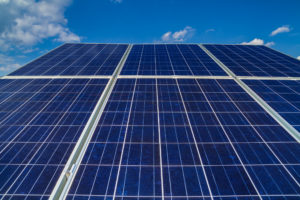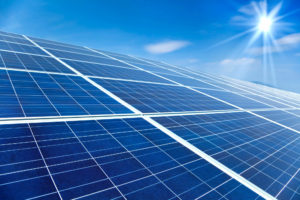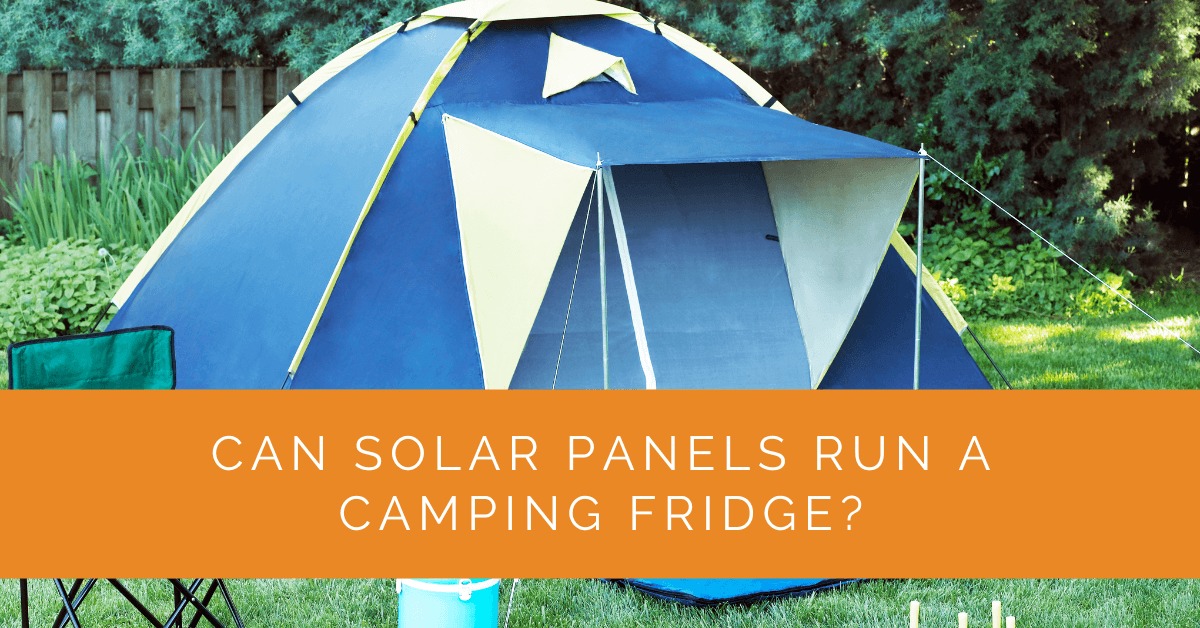Imagine embarking on a camping adventure, surrounded by nature’s beauty, and enjoying the convenience of a perfectly chilled camping fridge powered by solar energy. Solar panels offer a sustainable and reliable alternative to traditional power sources, allowing you to go off-grid while keeping your food fresh and beverages cool. In this article, we explore the possibilities of using solar power to run a camping fridge, offering insights into selecting the right fridge, determining power requirements, sizing your solar panel system, and maintaining the system for optimal performance. Discover the benefits of harnessing solar energy for your outdoor excursions and unlock the potential of solar power to enhance your camping experience. Whether you are a seasoned camper or new to the world of solar energy, this guide will equip you with the knowledge needed to create a portable and eco-friendly power solution for your camping fridge. So, let’s delve into solar power and explore how it can power your camping fridge and elevate your outdoor adventures.
Contents
- 1 Key Takeaways
- 2 Choosing the Right Fridge for Solar Power
- 3 Determining Power Requirements for a Camping Fridge
- 4 Sizing Your Solar Panel System
- 5 Components of a Solar Power System for a Camping Fridge
- 6 Benefits of Using Solar Power for a Camping Fridge
- 7 Setting Up and Maintaining a Solar Power System for a Camping Fridge
- 8 Case Study: Running a Camping Fridge with Solar Panels
- 9 Expert Insights From Our Solar Panel Installers About Running a Camping Fridge with Solar Panels
- 10 Experience Solar Excellence with Us!
- 11 Conclusion
Key Takeaways
- Choosing the right camping fridge for solar power is crucial, considering power consumption, size, portability, and durability factors.
- Determining the power requirements of your camping fridge is essential for sizing your solar panel system and ensuring a sufficient energy supply.
- Components of a solar power system for a camping fridge include solar panels, a charge controller, a battery, and an inverter (if necessary), working together to harness and store solar energy efficiently.
Choosing the Right Fridge for Solar Power
The right camping fridge for solar power is crucial for optimal performance and energy efficiency. Consider the following factors when choosing a fridge for your solar-powered adventures:
Power Consumption and Efficiency
Look for a camping fridge with low power consumption to minimize the energy requirements of your solar power system. Energy-efficient models with high-quality insulation and efficient compressors are ideal choices. Check the fridge’s energy efficiency rating, typically displayed as an energy consumption figure in kilowatt-hours (kWh) per year.
Size and Capacity
Consider the size and capacity of the fridge based on your camping needs. Larger fridges may have higher power consumption, so finding the right balance between size and energy efficiency is essential. Opt for a size that can accommodate your food and drinks while ensuring sufficient space for proper air circulation.
Portability and Durability
Portability and durability are crucial since you’ll be using the fridge for camping trips. Look for lightweight and compact models designed for easy transportation. Robust construction and strong handles enhance the fridge’s durability, ensuring it can withstand the rigors of outdoor adventures.
Determining Power Requirements for a Camping Fridge
Calculating the power requirements of your camping fridge helps determine the solar power system’s size and capacity needed to run it efficiently. Consider the following steps to estimate the power requirements:
Determine Power Consumption
Identify the power consumption rating of your camping fridge. It is usually specified in watts or ampere-hours (Ah). Check the fridge’s technical specifications or user manual for this information.
Calculate Average Daily Energy Requirements
Multiply the fridge’s power consumption by the hours it runs each day. This calculation provides the average daily energy consumption in watt-hours (Wh) or kilowatt-hours (kWh). Consider factors such as compressor cycles and additional power demands from features like interior lighting or USB charging ports.
Account for Efficiency and Battery Losses
To ensure a reliable power supply, account for efficiency losses during energy conversion and losses in the battery system. Apply a factor, typically 1.2 to 1.5, to the average daily energy requirements to compensate for these losses and ensure a sufficient power supply.

Sizing Your Solar Panel System
To power your camping fridge with solar energy, you must correctly size your solar panel system. Consider the following factors to determine the appropriate system size:
Solar Panel Wattage and Efficiency
Evaluate the wattage and efficiency of the solar panels you plan to use. Higher-wattage panels produce more power, while higher efficiency ensures maximum energy conversion from sunlight. Consider a balance between panel size, efficiency, and available space for installation.
Average Daily Sunlight
Assess the average daily sunlight in your camping location. Consider factors such as climate, weather patterns, and shading from surrounding objects that may affect the amount of sunlight available. This information helps estimate the daily energy output of the solar panels.
Battery Storage Capacity
Account for the battery storage capacity in your solar power system. The battery stores excess energy generated during daylight hours for use during periods of low or no sunlight. Ensure the battery capacity is sufficient to meet the energy requirements of your camping fridge throughout the day and night.
Consider System Expansion
If you plan to power additional devices or expand your solar-powered setup in the future, consider sizing your solar panel system with future needs in mind. This flexibility allows for seamless integration of additional components without major modifications.

Components of a Solar Power System for a Camping Fridge
A solar power system for a camping fridge consists of several key components working together to harness and store solar energy.
The following components are essential for a reliable solar power system to run your camping fridge:
Solar Panels
Solar panels are the system’s heart, capturing sunlight and converting it into electricity. They consist of photovoltaic (PV) cells that generate direct current (DC) when exposed to sunlight. Consider the solar panels’ wattage, efficiency, and quality when selecting them for your system.
Charge Controller
A charge controller regulates the flow of electricity from the solar panels to the battery. It ensures the battery receives the optimal charging current and prevents overcharging or damage. A quality charge controller helps extend the battery’s lifespan and ensures efficient energy management.
Battery
The battery stores the excess solar energy generated during the day for use during periods of low sunlight or at night. Choose a deep-cycle battery designed for solar applications. Consider its capacity, voltage, and cycle life to meet the energy storage requirements of your camping fridge.
Inverter
An inverter is unnecessary if your camping fridge operates on 12V DC power. However, if your fridge requires AC power, an inverter is required to convert the stored DC power from the battery into AC power. Select an inverter that matches the wattage and voltage requirements of your fridge.
Wiring and Cables
Proper wiring and cables ensure efficient energy flow and minimize power losses. Use appropriately sized wires and cables to connect the solar panels, charge controller, battery, and inverter. High-quality, durable cables and connectors help maintain system efficiency and reliability.
Mounting and Support Structures
Consider the mounting and support structures for your solar panels. Depending on your camping setup, you may need mounting brackets, frames, or racks to position the solar panels securely. Ensure they are installed to maximize sunlight exposure and provide stability during transportation and outdoor conditions.

Benefits of Using Solar Power for a Camping Fridge
Utilizing solar power to run your camping fridge offers various advantages, making it an attractive option for outdoor enthusiasts. Here are some key benefits:
Sustainability and Environmental Friendliness
Solar power is a clean and renewable energy source that produces no greenhouse gas emissions during operation. By harnessing solar energy, you reduce your carbon footprint and contribute to a greener environment.
Cost Savings
Once you have invested in a solar power system, the ongoing cost of using solar energy is minimal. Sunlight is abundant and free, allowing you to save on traditional energy expenses during your camping trips.
Independence from Traditional Power Sources
By relying on solar power, you gain independence from traditional power sources. Whether camping in remote locations or experiencing power outages, solar energy provides a reliable alternative power source to keep your fridge running and your food fresh.
Setting Up and Maintaining a Solar Power System for a Camping Fridge
Proper setup and maintenance of your solar power system ensure optimal performance and longevity. Follow these guidelines for an efficient and reliable setup:
Positioning and Orientation
Position the solar panels in an area with maximum sunlight exposure throughout the day. Orient them towards the sun, considering its path and any potential shading obstacles. Regularly monitor the positioning of the panels to ensure they are receiving optimal sunlight.
Wiring and Connections
Ensure all wiring and connections are secure and properly insulated. Use appropriate wire gauges to minimize power losses. Regularly check for loose connections or signs of damage and promptly address any issues to maintain system efficiency.
Battery Maintenance
Regularly monitor the battery’s charge level and ensure it remains within the recommended range. Keep the battery clean and debris-free, and periodically
check the electrolyte levels if using a flooded lead-acid battery. If using a sealed battery, ensure it is properly sealed and functioning correctly. Follow the manufacturer’s battery maintenance and charging guidelines to extend its lifespan.
Cleaning and Inspection
Periodically clean the solar panels to remove dirt, dust, or debris that may hinder their efficiency. Inspect the panels for any damage, such as cracks or loose connections. Regularly check the charge controller and inverter for proper operation and address any issues promptly.
Monitoring and Optimization
Monitor the performance of your solar power system using a monitoring system or device. This lets you track energy production, battery levels, and overall system efficiency. Analyze the data to identify potential issues or improvement areas, such as adjusting panel positioning or upgrading components.
Safety Considerations
When setting up and maintaining your solar power system, prioritize safety. Ensure proper grounding and follow electrical safety guidelines. Exercise caution when working with live electrical components, and consult a professional if you are uncertain about any aspect of the installation or maintenance process.
Following these guidelines, you can set up and maintain a reliable solar power system for your camping fridge. This enables you to enjoy the convenience of a chilled fridge while embracing the benefits of solar energy and the freedom of exploring off-grid locations.
Case Study: Running a Camping Fridge with Solar Panels
Background
At Solar Panels Network USA, we have always been dedicated to promoting sustainable energy solutions. One of our projects involved a family of avid campers who wanted to use solar power to run their camping fridge during their outdoor adventures. This case study explores how we helped them achieve an eco-friendly and reliable power solution for their camping fridge.
Project Overview
The family approached us with a desire to transition to solar energy for their camping trips. They wanted to power their camping fridge without relying on traditional power sources, ensuring fresh food and beverages throughout their excursions. Our objective was to design and implement a solar power system tailored to their needs, providing a sustainable and portable solution.
Implementation
Selecting the Right Camping Fridge
We began by helping the family choose a camping fridge that was energy-efficient and suitable for solar power. Considering their needs, we recommended a compact, high-efficiency fridge with excellent insulation and low power consumption. This choice ensured minimal energy requirements while providing ample storage for their food and drinks.
Calculating Power Requirements
Next, we determined the power requirements of the selected camping fridge. The fridge’s power consumption was 45 watts, and it was estimated to run for about 8 hours daily. This resulted in a daily energy consumption of 360 watt-hours (Wh). To account for efficiency losses, we added a factor of 1.2, resulting in a total daily energy requirement of approximately 432 Wh.
Sizing the Solar Panel System
Based on the calculated energy requirements, we sized the solar panel system to ensure a sufficient energy supply. We recommended two 100-watt solar panels, providing a combined output of 200 watts. Considering the average daily sunlight of 5 hours, the panels would generate approximately 1000 Wh per day, comfortably exceeding the fridge’s requirements.
Component Selection and Installation
We selected high-quality components to ensure system efficiency and reliability:
- Solar Panels: Two 100-watt monocrystalline panels known for their high efficiency and durability.
- Charge Controller: A 20-amp MPPT charge controller to optimize energy flow from the solar panels to the battery.
- Battery: A 100Ah deep-cycle AGM battery to store excess energy generated during the day for use at night.
- Inverter: A 300-watt pure sine wave inverter to convert DC power from the battery to AC power for the fridge.
Our team installed the system, ensuring proper wiring and secure connections. The solar panels were mounted on a portable frame for easy transportation and optimal sun exposure.
Results
Reliable Energy Supply
The solar power system consistently provided sufficient energy to run the camping fridge, even during extended trips. The battery storage allowed for continuous operation through the night, ensuring the family always had access to fresh food and cold beverages.
Environmental Impact
By switching to solar power, the family significantly reduced their carbon footprint. The use of renewable energy eliminated the need for fossil fuels, contributing to a cleaner environment. This project showcased the potential for sustainable camping practices.
Cost Savings
Although the initial investment in the solar power system was considerable, the family realized long-term cost savings. With no ongoing fuel expenses and reduced reliance on grid electricity, their camping trips became more economical over time.
Enhanced Camping Experience
The convenience of a solar-powered fridge enhanced the family’s camping experience. They enjoyed the freedom of off-grid camping without compromising on comfort. The system’s portability allowed them to explore remote locations while maintaining a reliable power source.
Summary
Our project to power a camping fridge with solar energy demonstrates the viability and benefits of using renewable energy for outdoor adventures. By carefully selecting energy-efficient appliances, accurately calculating power requirements, and designing a robust solar power system, we provided the family with a sustainable and reliable solution. This case study highlights how solar power can transform camping experiences, offering cost savings, environmental benefits, and enhanced convenience. At Solar Panels Network USA, we continue to empower individuals and families to embrace solar energy and enjoy the great outdoors sustainably.
Expert Insights From Our Solar Panel Installers About Running a Camping Fridge with Solar Panels
Choosing a camping fridge with low power consumption is critical for an efficient solar setup. Models with high-quality insulation and efficient compressors maximize the effectiveness of your solar power system.
Senior Solar Technician
Accurate calculation of your fridge’s power requirements ensures you size your solar panel system correctly. This step is essential for maintaining a reliable energy supply during your camping trips.
Solar Energy Specialist
Proper maintenance of your solar power system, including regular cleaning and inspection, is crucial for optimal performance. Keeping your components in top condition ensures your fridge stays cool throughout your adventures.
Solar Installation Expert
Experience Solar Excellence with Us!
Trust in Solar Panels Network USA, where our seasoned experts deliver top-quality solar solutions for homes and businesses nationwide. With a legacy of countless successful installations and a commitment to sustainable energy, we’re your reliable partner in the solar journey. Ready for a brighter, eco-friendly future? Call us now at (855) 427-0058 and harness the power of the sun!
Conclusion
Harnessing the power of solar energy to run your camping fridge opens up a world of possibilities for outdoor enthusiasts. By carefully choosing the right fridge, determining power requirements, sizing your solar panel system, and maintaining it properly, you can enjoy the convenience of chilled food and beverages while reducing your environmental impact.
Solar power offers a sustainable and renewable energy source and provides cost savings in the long run, independence from traditional power sources, and the freedom to explore off-grid locations. Embracing solar energy for your camping fridge allows you to fully immerse yourself in nature without compromising on the modern conveniences that enhance your outdoor experience.
So, start your journey towards a greener and more sustainable camping experience by incorporating solar power into your setup. Explore the benefits of solar energy, design a reliable solar power system, and relish the freedom of having a chilled fridge powered by the sun’s energy. Embrace solar power and embark on unforgettable adventures while keeping your food fresh and cool with a solar-powered camping fridge.
About the Author
Solar Panels Network USA stands at the forefront of solar energy solutions, driven by a team of seasoned solar engineers and energy consultants. With over decades of experience in delivering high-quality solar installations and maintenance, we are committed to promoting sustainable energy through customer-centric, tailored solutions. Our articles reflect this commitment, crafted collaboratively by experts to provide accurate, up-to-date insights into solar technology, ensuring our readers are well-informed and empowered in their solar energy decisions.

